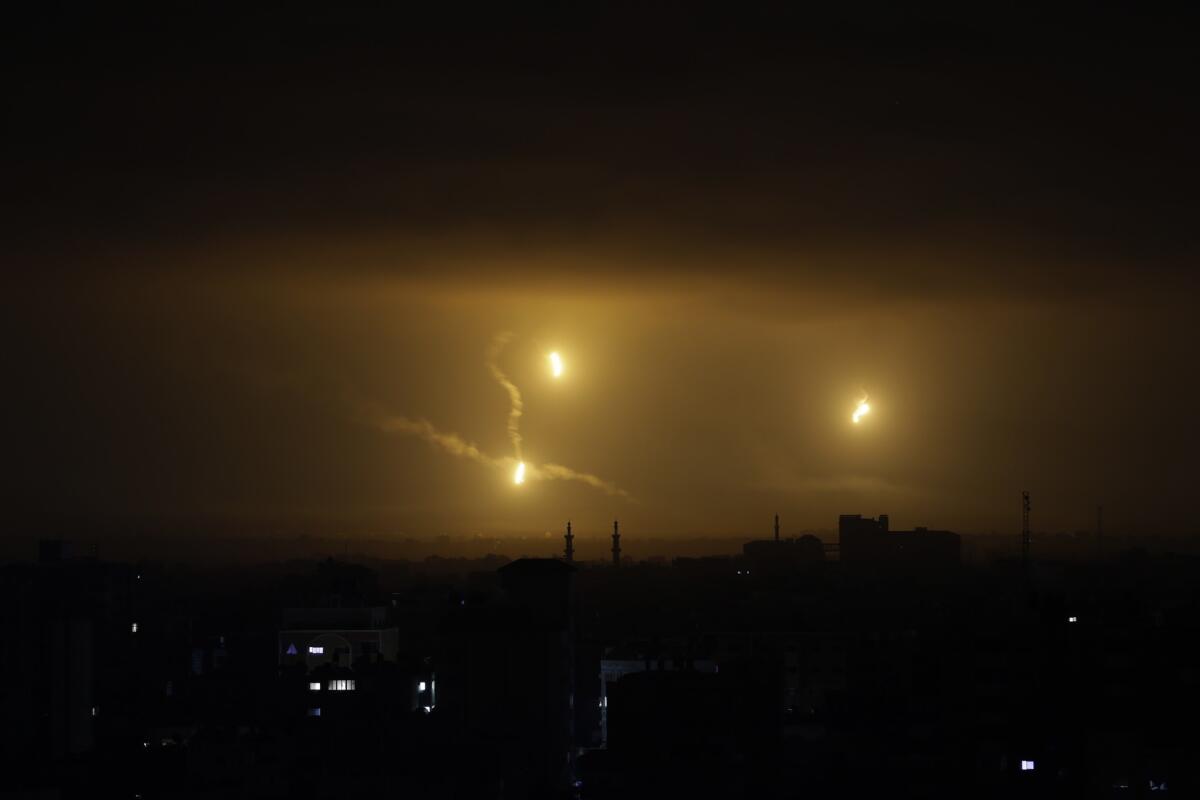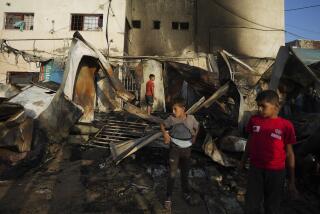72-hour cease-fire called in Israel-Palestinian fighting

Reporting from Washington — Israel and Hamas have agreed to a 72-hour cease-fire, Secretary of State John F. Kerry and U.N. Secretary-General Ban Ki-moon said Thursday.
In a statement in India, where Kerry is traveling, the two said that Israeli troops would be allowed to remain in place during the pause in fighting, during which humanitarian supplies will be allowed into Gaza.
Kerry said that Israel also would be allowed to continue to destroy tunnels dug by Hamas, a key goal of the Israeli assault.
“Israel will be able to continue its defensive operations for those tunnels that are behind its lines, and the Palestinians will be able to receive food, medicine, and additional humanitarian assistance” Kerry told reporters in New Delhi.
Earlier in the day, Israeli Prime Minister Benjamin Netanyahu vowed to continue destroying the tunnels “with or without a cease-fire.”
“Israeli and Palestinian delegations will immediately be going to Cairo for negotiations with the government of Egypt, at the invitation of Egypt, aimed at reaching a durable cease-fire,” Kerry said in a statement.
The cease-fire is scheduled to begin at 8 a.m. Friday. During the following 72 hours, Israeli forces will be allowed to remain in place in Gaza, a feature of a previous Egyptian cease-fire proposal that Hamas had objected to.
“During this period, civilians in Gaza will receive urgently needed humanitarian relief, and the opportunity to carry out vital functions, including burying the dead, taking care of the injured, and restocking food supplies. Overdue repairs on essential water and energy infrastructure could also continue during this period,” Kerry said.
“We urge all parties to act with restraint until this humanitarian ceasefire begins, and to fully abide by their commitments during the ceasefire,” he said.
Hours before the cease-fire was announced, Netanyahu reiterated Israel’s determination to continue efforts to neutralize the tunnel threat. Israeli military officials said Israeli forces were working around the clock to destroy the remainder of approximately three dozen tunnels that have been detected, and hoped to complete operations in the next few days.
In Gaza, representatives of both Hamas and Islamic Jihad expressed willingness to abide by the cease-fire, provided the other side does also.
Despite the call for restraint on both sides, there was fear in Gaza that Israel would strike hard overnight in the final hours before the humanitarian pause took effect, after a day of rocket fire emanating from the coastal enclave. Israeli military officials warned journalists staying in several hotels on Gaza City’s waterfront against going outdoors after a rocket was launched in the early evening from a lot close to one of the hotels.
During the last few days, humanitarian pauses declared by one side or the other have quickly degenerated into more fighting. The notable exception was on Saturday, when fighting largely came to a halt for 12 hours, during which Palestinians hurried to areas devastated by bombardment to try to dig out the dead and recover belongings. Afterward, the fighting resumed with redoubled fury.
The conflict has left more than 1,300 Palestinians dead, including nine who were reported killed Thursday. Israel has lost at least 56 troops, its largest military death toll since the 2006 war in Lebanon.
With the offensive in its fourth week, Israel called up 16,000 more reservists, but military officials said that should not necessarily be read as a sign of an escalation of the battle against Hamas, the militant group that controls Gaza. About 59,000 reservists were called up before the start of the ground operation July 17, and some of those are being rotated away from the front, officials said.
Times staff writers Richter reported from Washington and King from Gaza City. Special correspondent Batsheva Sobelman in Jerusalem contributed to this report.
Twitter: @laurakingLAT
Twitter: @richtpau
More to Read
Sign up for Essential California
The most important California stories and recommendations in your inbox every morning.
You may occasionally receive promotional content from the Los Angeles Times.











